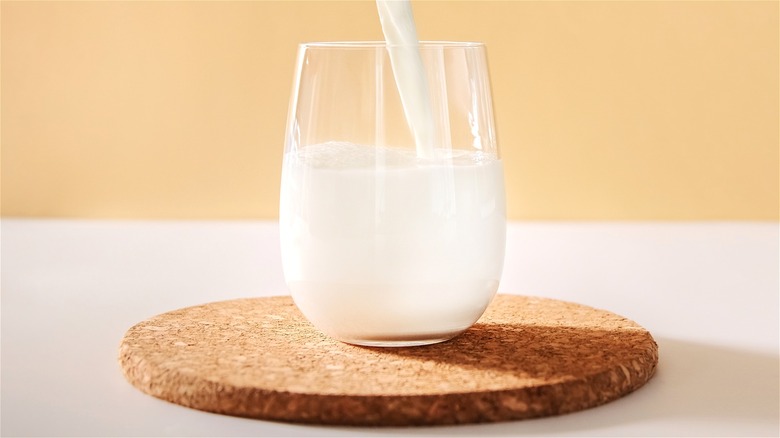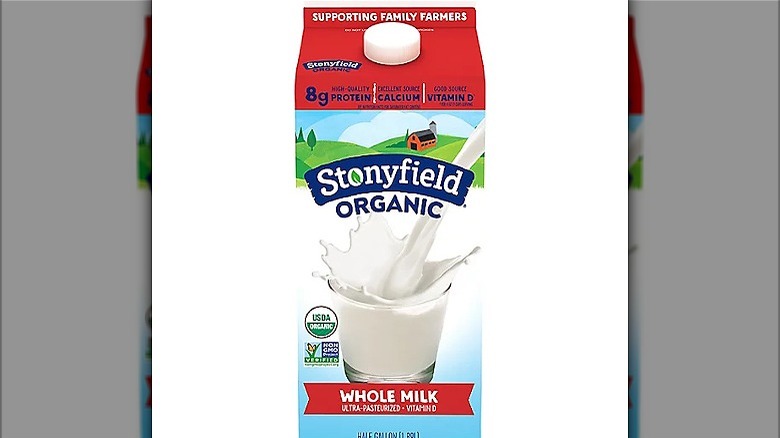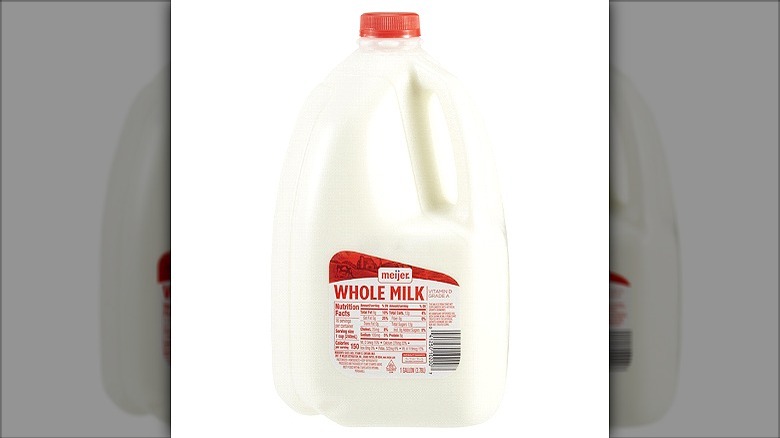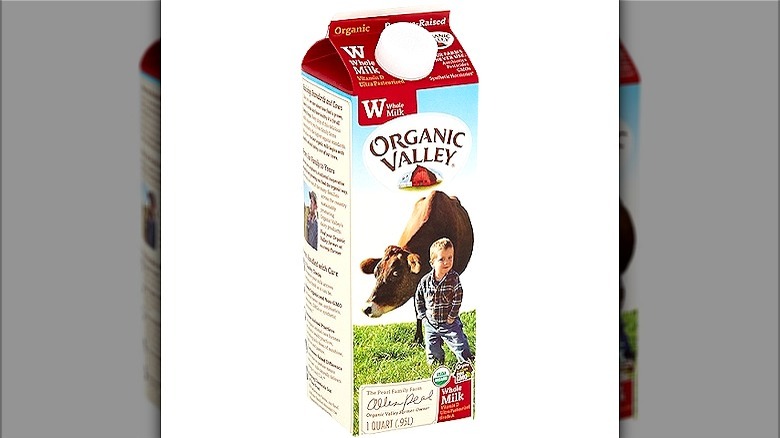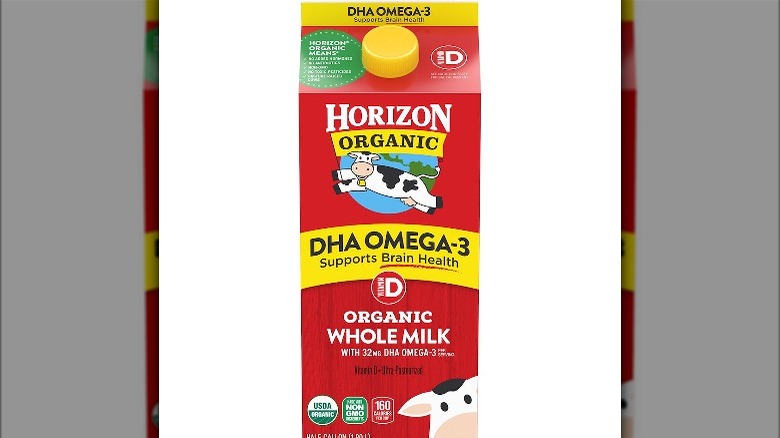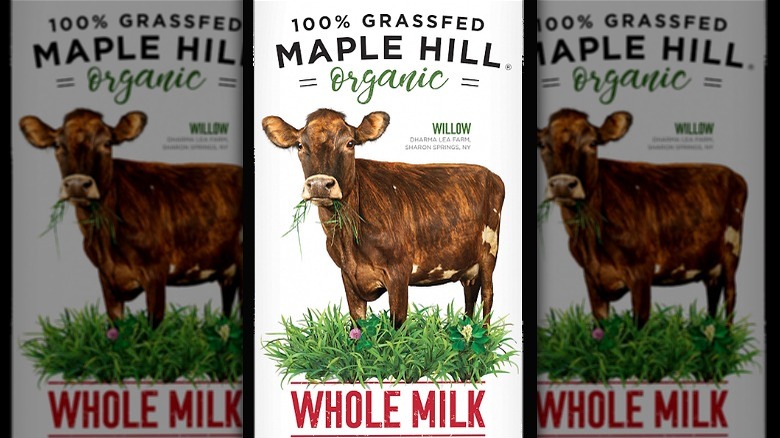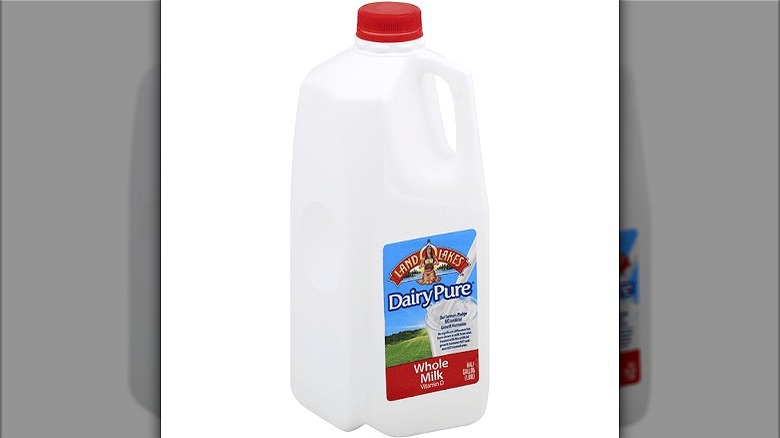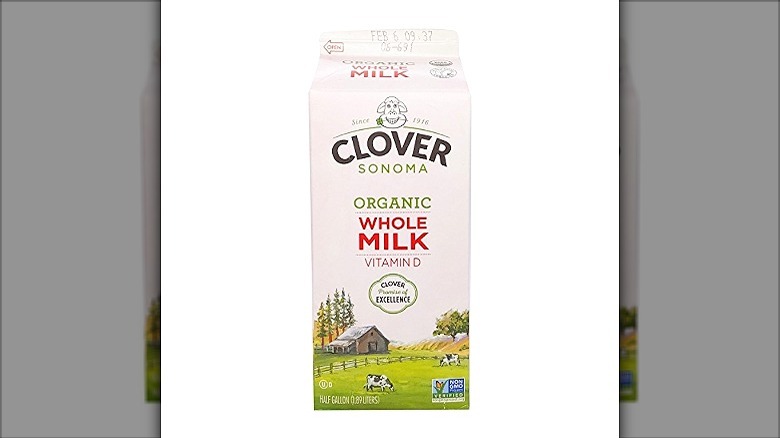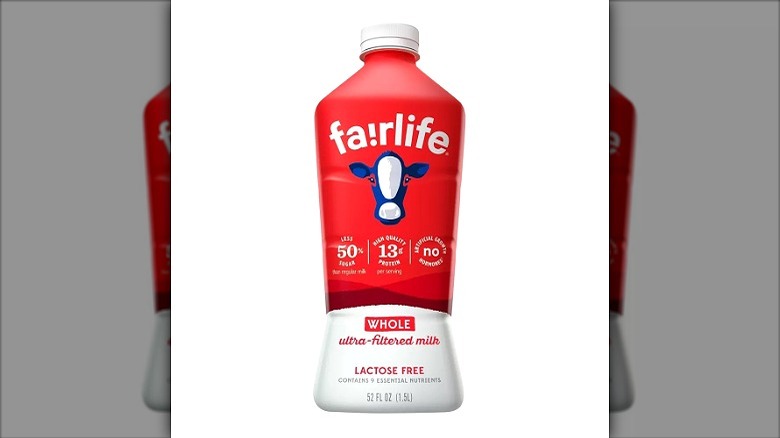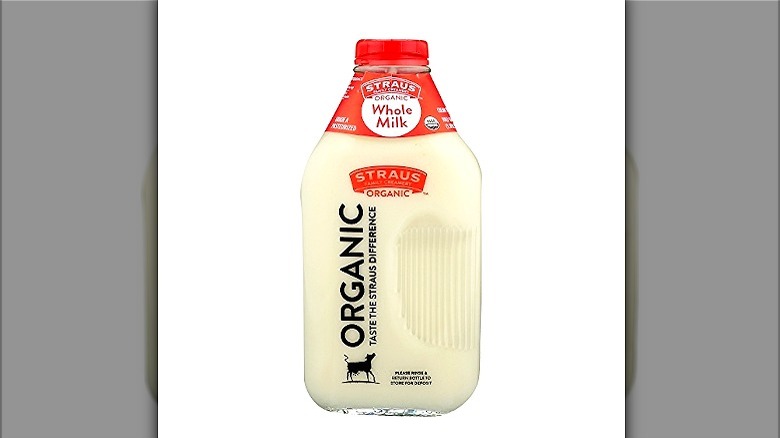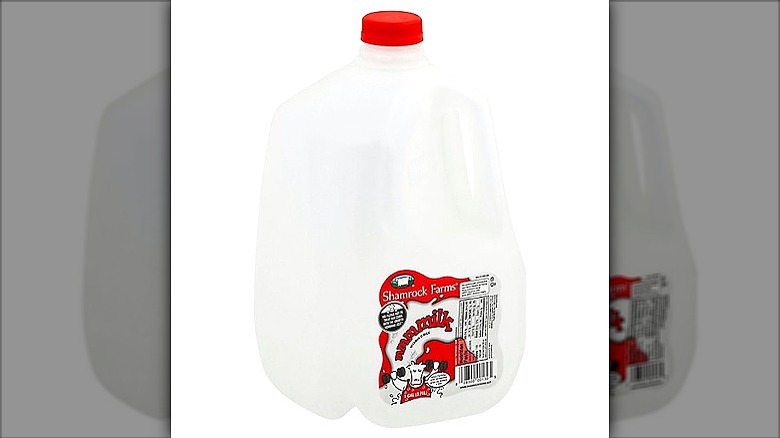Whole Milk Brands You Should And Shouldn't Buy
Whole milk is known for its rich and creamy flavor. According to a survey conducted by Mashed, 60% of respondents prefer it. Baristas favor whole milk for making espresso drinks because it steams the easiest when making frothy beverages like cappuccinos, explains HuffPost.
These qualities have to do with whole milk's fat content of around 3.25%, higher than the milk fat percentage in 1% milk or 2% milk (both of which contain the amounts of fat their names imply). People concerned about their saturated fat intake might be told to stay away from whole milk, but the beverage also contains many nutrients, including vitamin A, calcium, vitamin D, potassium, zinc, magnesium, vitamin B12, and others, according to WebMD.
There are a few qualities to look out for when shopping for whole milk. For example, we recommend staying away from generic, off-brand, or store-brand dairy products. These types of milk are not usually organic (via Mamavation) — meaning they may expose the drinker to potentially harmful pesticides — and they don't usually come from grass-fed cows (which means the taste and animal welfare practices of these non-organic milks may be worse). Whole milk makers that are organic and cruelty-free often tend to make great-tasting products. Luckily for you, we've rounded up several ethical, high-quality brands that make whole milk. We've also highlighted ones to avoid. Read on to discover which whole milk brands you should and shouldn't buy.
Buy: Stonyfield Organic
Stonyfield Organic is a dairy brand that we recommend. The company was founded in New Hampshire during the 1980s and has maintained its commitment to organic farming since this time. Today, it sells milk, yogurt, smoothies, frozen yogurt, and more. All of its products are certified USDA organic. This means that Stonyfield's whole milk is made without genetically modified ingredients, antibiotics, hormones, pesticides, preservatives, and artificial flavors.
Per Stonyfield Organic's website, the dairy brand's whole milk comes in gallon and half-gallon sizes. The milk comes from cows that are pasture-raised, meaning they're given time to graze outdoors. While this term does not automatically mean the cows are entirely grass-fed, Stonyfield does state on its website that its cows eat some grass. Pasture-raised and grass-fed cows are considered to have better, healthier lives than indoor cows, meaning Stonyfield organic is mindful of animal welfare. Milk from grass-fed cows is also believed by some to taste better (via Eat Magazine).
According to customer reviews, Stonyfield Organic's whole milk tastes satisfactory. On the dairy's website, people were pleased with the brand's whole milk. "Stonyfield Organic Milk is the best-tasting milk I have tasted. Some milks do not get that cold refreshing taste. Stonyfield gets ice-cold and has that icy-cold taste that goes down smooth," one reviewer wrote. "High-quality milk. Works great in recipes, stays good for a very long time in the refrigerator," another person said on Influenster.
Don't buy: off-brand whole milk
When you're looking for whole milk, you're bound to come across the generic stuff in your local grocery store. Although these off-brand items may be cheaper than the name-brand stuff, we don't recommend buying them. That's because these brands tend not to be organic or don't have certain animal welfare considerations within their business practices. If you look at the generic milk sold at grocery stores like Costco, Meijer, Walmart, and other chains, you'll find that this is true. To us, the lack of certifications maintained by these off-brand dairies is just one signal of the lower quality they have.
The fact that generic milk brands are not usually organic, grass-fed, or non-GMO certified is an indication that the company is putting less effort in than competing brands. With this in mind, it should come as no surprise that the milk made by these companies tastes worse. Whole milk sold by generic brands is no exception.
For the store-brand whole milk sold at Walmart, users criticized its flavor. "It tastes horrible," wrote one dissatisfied customer. "Being a lifelong milk drinker I have on rare occasions purchased a gallon of milk that had turned bad before the expiry date. This Great Value milk, however, has been consistently terrible," said another Walmart shopper who purchased the store's whole milk. Of course, not everyone thinks Walmart's milk is the worst. But we believe you can get a much better-tasting product than the ones made by major retailers.
Buy: Organic Valley
Organic Valley is a dairy brand headquartered in Wisconsin. It has existed since the 1980s, when it first set high organic standards for itself. Those standards are still in place today, which is a good thing for shoppers looking for organic whole milk. Since its products are USDA organic, they are also non-GMO certified. Per Organic Valley, the dairy's commitment to organic farming practices also means it also puts additional effort toward animal care and sustainability. Its cows spend time grazing in pastures, and the company makes efforts to use renewable energy such as solar power.
This brand makes two types of whole milk. The first is regular, "Ultra Pasteurized" whole milk. This term means the milk is heated to a higher temperature than typical pasteurization, according to Organic Valley. It doesn't mean the milk is "cleaner" than milk pasteurized using other methods, but its shelf life is longer. Organic Valley's other whole milk product is called Grassmilk. It is made from cows that graze on grass and foraged plants instead of grains. Organic Valley's Grassmilk is also ultra pasteurized.
Whole milk consumers admire Organic Valley's products for their excellent taste and texture. On Amazon, fans of milk from grass-fed cows have raved about Grassmilk, praising this product's unique taste. "This is the best milk I have tasted in years. Tastes like the jersey milk we [used] to get when I was a kid!! It's just the opposite of the watery stuff we get nowadays," one person wrote.
Don't buy: Horizon Organic
Not every "organic" brand is totally trustworthy or worth buying. This is the case with the dairy company Horizon Organic. This brand appears very similar in name and labeling to a brand that we like, Organic Valley. But as Colorado Boulevard points out, the two companies are not very similar. Many of Horizon Organic's substandard farming practices stem from the fact that it operates large-scale dairies. One of the ways this manifests itself is in cows receiving far less time in pastures. This can have a negative impact several things, including the health of Horizon Organic's cows and milks.
Horizon Organic has also been criticized for using controversial ingredients. The Chicago Tribune reports that some of Horizon Organic's milks are fortified with a type of algae also known as Schizochytrium. This ingredient is added to Horizon Organic's Whole Milk with DHA Omega-3 so that the product can be linked to the health benefits of omega-3 fatty acids. However, the Chicago Tribune points out that this ingredient is brewed in metal vats inside factories before making it into your milk. While not technically inorganic or illegal, this may not be the image people have in mind when they purchase organic whole milk.
This is just some of the sneakiness that brands like Horizon Organic are trying to pull off. The taste isn't always high quality, either. "Bought for a year, last bottle tasted odd and smokey," said one person of the brand's whole milk.
Buy: Maple Hill Organic
Maple Hill Organic is a dairy brand that we recommend. Per its website, it is committed to making organic dairy products from grass-fed cows. This type of grazing is considered superior by Maple Hill for being less harmful to cows, the environment, farmers, and milk drinkers. Unlike other companies — which allow cows to pasture graze part-time on a mixed diet — Maple Hill Organic allows its cows to dine solely on grass, 365 days a year. The company produces butter, yogurt, kefir, and milk.
The only ingredient in Maple Hill Organic's Whole Milk is, well, whole milk. We like to keep things simple, so we like to see shorter ingredient lists, especially from high-quality brands like Maple Hill Organic. Note that unlike other companies, Maple Hill Organic's whole milk is not enriched with Vitamin D3. This practice is not necessarily a bad thing, but it is a little outdated. According to Global Health Now, vitamin D's widespread placement in milk products began in the 1930s as a response to a rise in rickets cases among children.
People like Maple Hill not only for its USDA organic and grass-fed certifications but also its flavor. On the review website Influenster, customers were eager to celebrate this aspect of the brand's whole milk. "Creamy, delicious, and grass-fed! This is the only whole milk that I buy each week," wrote one person. "No joke, this is the best milk I have ever tasted. It's creamy and delicious, and it doesn't hurt my stomach like other milks do," said another fan.
Don't buy: Land O'Lakes
Land O'Lakes is another company that we wouldn't recommend buying whole milk from. For one, this is a brand that lacks all of the desired health certifications. Land O'Lakes products are not organic or non-GMO certified. Its cows are not grass fed or pasture raised. Land O'Lakes factory farms are environments very different from the ones maintained by smaller companies with stronger commitments to animal welfare.
According to an investigation by PETA, there was a routine lack of care given to the cows housed in one of Land O'Lakes' Pennsylvania suppliers. The investigation discovered that cows' pens were not well maintained, cows were not given necessary medical treatment, and cows' tails were removed in a process called "tail-docking," which is illegal in California.
The taste of Land O'Lakes' whole milk isn't the best, either. On Influenster, a reviewer noted, "Land O'Lakes milk is an OK brand ... not as creamy as I like it to be." We don't recommend buying any of the milk sold by Land O'Lakes.
Buy: Clover Sonoma
Clover Sonoma sells chocolate milk, cottage cheese, eggs, kefir, buttermilk, eggnog, butter, cream cheese, yogurt, and more delicious dairy items. This is another brand that is mindful of customers, farmers, animals, the environment, and the communities it impacts (like its employees). The company shows this by being a certified B corporation, not using genetically modified products, and being American Humane certified.
Clover Sonoma sells two types of whole milk, and we recommend buying the product that is certified organic. In addition to the milk being organic, the cows that produce it are raised in a pasture and fed a diet containing (but not limited to) grass. Many believe this helps to produce great-tasting milk.
On the website Social Nature, people who purchased Clover Sonoma's organic whole milk were happy they did. "My son is a milk snob and loved Clover's whole milk so much. I drank a glass before he finished it and I thought it tasted really great also," wrote one shopper. "The best organic milk on the market with a smooth taste," said another satisfied customer.
Don't buy: Fairlife
Fairlife is another milk brand that we recommend you avoid buying. This brand is not committed to making completely organic items or products free from genetically modified ingredients. Its cows are fed with grains that are genetically modified, according to Fairlife. The brand does not have any concrete animal welfare certifications. It does not allow its cows to pasture-graze, nor are its animals grass fed. All of these things contribute to a product we don't like.
According to Today, harmful animal welfare practices at Fairlife were revealed to be so bad that some grocery stores removed the brand's products from their shelves in 2019. Fairlife's products were pulled when a video was released that showed its dairy cows being abused by Fairlife employees. The abuses included beatings, malnutrition, and lack of medical attention. None of this makes us want to patronize Fairlife.
Some customers weren't huge fans of Fairlife's lactose-free whole milk (which appears to be the only type of whole milk that the company produces). "The smell of the milk is a little bit weird," said one person on Influenster. "It has a weird after taste," said another.
Buy: Straus Family Creamery
Straus Family Creamery makes excellent whole milk. In fact, one of its farms also supplies milk for Cowgirl Creamery, one of the most award-winning cheese brands in the United States. Straus is committed to organic products, sustainable manufacturing, and carbon-neutral farming. It has methods for supporting these commitments built into its business model. If you're interested in more than whole milk, Straus conveniently makes yogurt, ice cream, butter, sour cream, and other delicious dairy products.
We recommend the Organic Cream-Top Whole Milk made by Straus Family Creamery. This milk is unique in that it is not homogenized, creating a layer of cream that can be seen floating on top of your milk. It is also not ultra pasteurized, which Straus says helps to create a more natural (thus better-tasting) whole milk. Additionally, this whole milk is not vitamin enriched, meaning its only ingredient is whole milk. The product is USDA organic certified, non-GMO certified, kosher certified, and CCOF (California Certified Organic Farmers) certified. It also comes in a glass bottle that can be reused or recycled.
Fans of Straus are quick to recommend its milk to others online. "I buy their products regularly and they're also ridiculously good," wrote a customer on Reddit. "The best milk I have come across in my area is Straus," said another Reddit user.
Don't buy: Shamrock Farms
If you're going to buy whole milk, don't buy it from Shamrock Farms. The company has been accused of terrible animal welfare practices at its factory farms. Mamavation notes that Shamrock Farms is one of many companies that rely on industrial-scale farming to produce its milk, meaning that its cows are confined to indoor spaces instead of being allowed outside to graze on grass or get fresh air.
According to an investigation by The Cornucopia Institute, Shamrock Farms was also found to be operating a factory farm illegally for several years. This farm was home to more than 16,000 cows that were housed in subpar living conditions. The investigation claimed that because the USDA allowed Shamrock Farms to operate this farm illegally for years, smaller, more ethical, and law-abiding dairy farms potentially suffered financial damage as a result of having to compete with Shamrock.
Whether that specific facility is still operating or not, we prefer to not buy milk that comes from factory farms like the ones owned by Shamrock Farms. These conditions are not good for the cows. On top of that, it's not at all appealing to think about drinking milk that comes from cows that don't eat grass or go outside (while these may be the least of their problems). Even more concerning is the impact that these farms have on the environment. Manure produced by factory farms has been traced to large-scale pollution of waterways (via PETA). We could easily just buy whole milk from a different brand.
Static Media owns and operates Daily Meal and Mashed.
